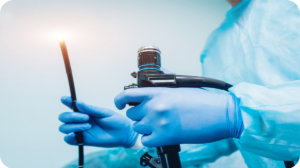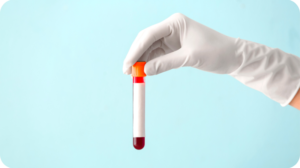Nobody looks forward to a colonoscopy. Although modern technology has made the procedure pain-free and simple for the patient, preparing for the exam can be unpleasant and uncomfortable. Those physical aspects are only one part of the picture, though. A colonoscopy involves a certain amount of anxiety over what might be found—most pointedly, cancer. It’s not an unreasonable fear. Colorectal cancer (CRC) is the third leading cause of cancer deaths among both men and women. Early detection is key to attacking the illness early, when you have the best chance of defeating it.

A colonoscopy is perhaps the most important and effective diagnostic tool for colorectal cancer prevention and detection. It is the “gold standard” of CRC screening and unique because it can not only detect cancer, it can also prevent future CRC. The doctor excises suspicious polyps during the exam, removing them before they become cancerous. Even if your doctor finds cancer during a colonoscopy, the sooner it is detected, the more treatable it is—and the less life-altering and disruptive that treatment will likely be.
Because the incidence of CRC increases exponentially with age, colonoscopies become a regular diagnostic tool beginning in late middle age. Conventional medical wisdom has long held that the optimal age to start diagnostic colonoscopies is 50. Recent studies have changed that thinking.
The new recommendation is for healthy adults to have their first colonoscopy at 45. A recently published review of subjects in the famous Framingham’s Nurse’s Health Study has found that women who had colonoscopies at 45 had a 50 to 60 percent lower risk of CRC than their equivalents who had not been screened. Both the American Cancer Society and the U.S. Preventative Services Task Force now advise adults to begin regular colonoscopies at 45.
The Process
A colonoscopy begins with preparation the night before. The doctor will prescribe a laxative preparation that you’ll drink on a schedule. The next day, you’ll be sedated just prior to the procedure. While you’re unconscious, the doctor will guide an endoscope tube—a thin, flexible tube with a camera, light, and small cutting tool—up into the rectum, proceeding into the colon. Immediately following the procedure, the doctor will discuss the results with you. The entire procedure usually takes less than 30 minutes. Pain and side effects are rare, and usually temporary.
Frequency
Unfortunately, this is not a one-and-done diagnostic tool. It is part of regular cancer monitoring that continues throughout the rest of your life (or at least until you reach 85, when the risk of death from natural causes is far greater than the risk of cancer). Most doctors recommend that any healthy adult with low to average risk of developing colon cancer, should have follow-up colonoscopies every 10 years.
If, however, your gastroenterologist found and removed suspicious polyps, you are diagnosed with cancer in another part of your body, or a parent, sibling, or child is diagnosed with CRC, you are at elevated risk. Other conditions may also raise your risk. Here’s a short list of potential indications that will lead your doctor to schedule more frequent colonoscopies.
- Personal history of CRC or suspicious polyps.
- Family history of CRC.
- Personal incidence of inflammatory bowel disease, such as Crohn’s or ulcerative colitis.
- Suspected or confirmed genetic predisposition to CRC (including, for instance, familial adenomatous polyposis (FAP) and Lynch Syndrome).
- History of abdominal or pelvic radiation treatments.
In those cases, your doctor may recommend a follow-up exam in 3 years, rather than 10. In some cases, such as where an abnormal or large polyp was removed, or where you’ve actually had CRC, the doctor will recommend yearly colonoscopies until repetitive exams show that you are free of warning signs and symptoms, and your colon appears healthy. At that point, the frequency may be reduced.





